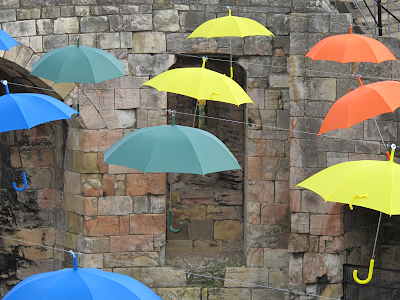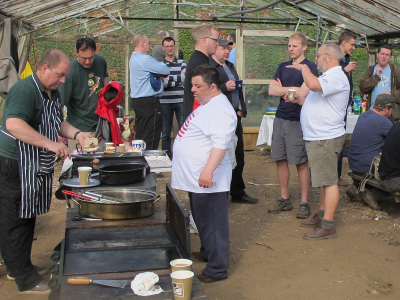Let's see what we can learn from Ezekiel 47:1-12. Nothing you read below is based on detailed study of the Hebrew or theological analysis, it's simply what the Holy Spirit highlighted as I read the passage and meditated on it.
I sat with my friend Sean last Monday (we meet most Monday evenings) and we had fresh insights that I would, on my own, have missed. So thanks Sean!
There are great similarities between this Old Testament passage and Revelation 11:1-2 and especially Revelation 22:1-5. We were also drawn to John 4:1-42 in which Jesus speaks with the Samaritan woman at the well. In fact let's look at that first.
The woman at the well - After striking up a conversation about water, Yahshua tell the woman that if she'd known who he is she'd have asked him and he'd have given her 'living water' (John 4:10). She knows the well is the only local source of water so she's puzzled. In Jewish thinking (and probably in Samaritan thinking too) living water means flowing water.
Water in a well is not flowing so it is not living. Jesus says this living water from him is special, if you drink it you won't get thirsty again. In fact it will become a spring welling up inside and will result in eternal life (John 4:13-14). The water of life is a free gift to any who will come and take it (Revelation 22:17).
The temple and the flow of water - The temple in Ezekiel 47:1 seems to me to represent the church. In the New Testament the church is the community of people who believe in and follow Yahshua (Jesus). there are several metaphors for the church - the body of Christ (Ephesians 4:12), the Bride of the Lamb (Revelation 21:9), and often a temple (2 Corinthians 6:16) built of living stones (1 Peter 2:5).
If the temple represents the church (in Ezekiel and in the similar passages of Revelation), then this river of life that trickles and grows from under the threshold of the temple comes from the foundation that lies under the church, and that is Christ (1 Corinthians 3:11).
So this trickle of life, this living water is in all of us who believe. If you are in Christ and he is in you, his unending supply of life will flow out through you into a thirsty world. You will never need to visit a well to pull up a heavy bucket of water. That is getting water by your own effort, it's hard work and you can never draw enough to satisfy yourself, let alone others.
But the living water from within flows without ceasing and is fresh and clean and fully satisfying.
The east - Why does the entrance of the temple face east? Is this significant? Yes, I think it is. East is the direction of rising, all the stars and planets rise in the east and set in the west, the moon and the sun also rise in the east. Jesus is described as the morning star (2 Peter 1:19), and he is the rising star (Revelation 22:16).
The ideas of east, rising and morning are closely related, so the river leaves the east gate. It first appears inside the southern part of the temple near the altar, runs through the temple court (see Revelation 22:1-2), and then flows under the southern side of the threshold of the east gate and from there heads east from the city.
More on the river - The river grows rapidly larger as it flows, and after just two kilometres (about a mile and a quarter) it's already too large to wade across. From there, the river flows to the northern part of the Dead Sea and it turns the clear but sterile, salty waters into fresh water and the Dead Sea teems with a wide variety of fish. Along the river's banks grow the trees of life that fruit every month and produce leaves for the healing of the nations.
This is truly the river of life! It brings fish to a dead sea, provides trees in the desert, and heals the world's people.
The river is also mentioned in Esther 10:4-9. And let me tell you you won't find those verses in your Bible (unless you pick your Bible very carefully), but that's another story. Esther is here identified as the river. And why not? Just think, the river flows in those who love and honour the Lord. The river is life for his people. Jesus said that streams of living water would flow out of us (John 7:38). It's not hard to see that the river flowing out of Esther brought life to the Jews in captivity.
Note: Mordecai's dream is given in Esther 11:2-12 which is in the first chapter of the Greek version of Esther. (Are you confused yet?) I should also point out that the Greek sections of Esther seem to have been added later to the original Hebrew. Most Bibles provide only the Hebrew parts.
In the next post we'll look at the river of life again and dig into what it all means for us in practice.
Questions:
- How do you feel about your own flow of spiritual water? Have you received the living water that Jesus provides?
- Most of us feel like barren deserts sometimes. If you have felt that way, how were you refreshed and renewed again?
- Do you know someone in a spiritual desert right now? Who do they need to have a conversation with?
- The Nile runs through the Sahara. Can you list some ways life is different in Egypt because of the Nile?
See also:
- Book of Esther - Wikipedia
- Eating the scroll - Journeys of heart and mind
- From India with vision - Journeys of heart and mind
- John 4: Jacob's well - Journeys of heart and mind
- Living water - Premier Christian Media
- Nile - Wikipedia
- Thought for the day - Journeys of heart and mind














